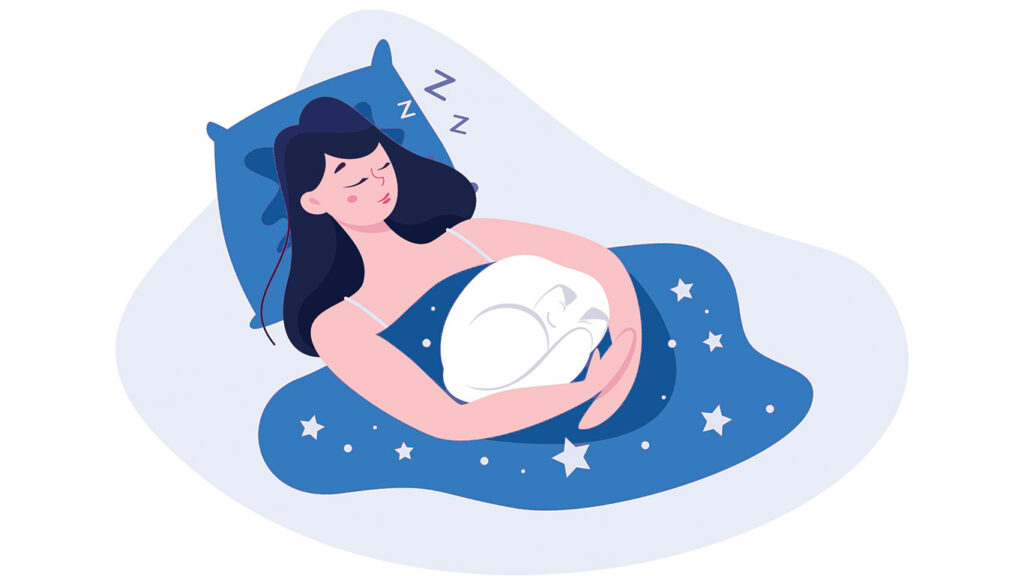
Sleep hygiene refers to practices and routines that help people fall and stay asleep each night,1 including sticking to a regular bedtime, maintaining a consistent bedtime routine, and creating an optimal sleeping environment.2 Developing and maintaining good sleep hygiene practices helps to ensure a good night’s rest for optimal physical and mental health.1
Infants, children, and adults can all benefit from consistent sleep hygiene routines.2 Infants should sleep from 16 to 18 hours a day; preschool children should sleep from 11 to 12 hours a day; school-aged children and teens should sleep for at least 10 hours a night; and adults should sleep from 7 to 9 hours per night.3
People may be suffering from poor sleep hygiene if they have trouble falling asleep, wake up frequently throughout the night, or feel drowsy during the daytime hours.2 Lack of a consistent sleep schedule can lead to poor sleep hygiene over time.2
The Importance of Sleep
The human body needs sleep to help fight off infections. While people sleep, the immune system produces a group of proteins known as cytokines, which help fight infections and inflammation.3 Research indicates that consistently well-rested individuals are better at fighting infections than those who do not consistently get a good night’s rest.3
A minimum of eight hours of sleep per night in adults has been shown to improve performance prior to completing a task, such as a school exam, and helps to improve learning compared to those who regularly sleep less than eight hours a night.3 A lack of sleep negatively affects attention, decision-making, and reaction times.3
Regular sleep for adults also helps to regulate appetite, energy, and weight.3 During sleep, the appetite suppressing hormone leptin increases, and the appetite stimulating hormone grehlin decreases.3 Those who sleep an average of five hours a night are more at risk for obesity compared to adults who sleep 7 to 8 hours.3
During deep sleep, heart rate and blood pressure gradually slows.3 During lighter sleep, heart and breathing rates rise and fall.3 These fluctuations promote cardiovascular health during a period of 7 to 8 hours of sleep per night for adults.3 Sleep-deprived individuals miss out on these cardioprotective processes that occur during sleep, resulting in increased risks for heart disease and stroke.3
Habits that Promote Poor Sleep Hygiene
Experts suggest avoiding caffeine during the late afternoon and evening hours, as consumption of caffeine within 6 to 8 hours before bedtime can affect the ability to fall asleep.3 Drinking alcohol before bedtime interferes with the ability to enter deep sleep.3 Large meals before bedtime can lead to indigestion, which gets in the way of a good night’s sleep.3 Further, experts recommend exercising during the daytime hours as opposed to nighttime, as daytime exercise is associated with better sleep.3
Blue light from electronics affects the production of melatonin in the evening hours and therefore negatively affects the ability to fall asleep.4 Children are especially vulnerable to the effects of blue light. Use of electronics at night often contributes to next-day drowsiness.4 Aside from electronics, bright lamps in the bedroom can also decrease melatonin in comparison to dim lighting, which does not adversely affect the production of melatonin.4
How to Improve Sleep Hygiene
Reading a book or listening to music can help the body wind down and prepare for bedtime.3 Taking a hot bath also helps prepare the body for bedtime, as the water’s effect on the body’s temperature can help to induce sleepiness and relaxation.3
To reduce the harmful effects of blue light on melatonin production, experts recommend turning off all electronics and dimming bright lights in the hour leading up to bedtime. To further optimize the sleeping environment, it is recommended to keep the room’s temperature between 60 and 67 degrees and minimize any loud noises that may affect the space. If loud noises cannot be controlled, ear plugs can be used to dull exposure to the noise.1,5
If after making changes to sleep and bedtime routines and symptoms of sleep problems are still present, experts recommend consulting a primary care physician or a sleep specialist to help identify and treat any underlying issues or conditions that might be negatively impacting sleep.3
Sources
- Lindberg, S. What Is Sleep Hygiene? VeryWellMind. Updated 17 Jan 2023. https://www.verywellmind.com/what-is-sleep-hygiene-5085887. Accessed 2 May 2024.
- Suni, E. Rosen, D. Mastering Sleep Hygiene: Your Path to Quality Sleep. Updated 4 Mar 2024. https://www.sleepfoundation.org/sleep-hygiene#why-is-sleep-hygiene-important–1. Accessed 2 May 2024.
- National Heart, Lung, and Blood Institute. Your Guide to Healthy Sleep. National Institute of Health. Revised Aug 2011. https://www.nhlbi.nih.gov/files/docs/public/sleep/healthy_sleep.pdf. Accessed 2 May 2024.
- Pacheco, D. Truong, K. How Electronics Affect Sleep. SleepFoundation. Updated 2 Jun 2023. https://www.sleepfoundation.org/how-sleep-works/how-electronics-affect-sleep. Accessed 2 May 2024
- Pacheco, D. Rehman, A. Bedroom Environment: What Elements Are Important? Updated 8 Mar 2024. https://www.sleepfoundation.org/bedroom-environment. Accessed 2 May 2024.





